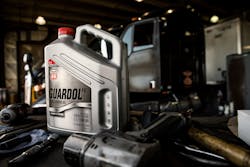A lot of moving parts make up a fleet’s maintenance budget. On average, fuel and labor represent a combined 80 percent of annual maintenance spending, while roughly only one percent is spent on lubricants. Though a smaller piece of the pie, choosing an engine oil is a big decision for a fleet’s bottom line – it can make a difference in what they spend on fuel and in time they spend in the maintenance bay.
As more modern engines are hitting the road, the demand on trucks for better efficiency and lower emissions is greater than ever. As a result, the industry is beginning to shift toward lower viscosity, fuel-efficient engine oils (FA-4). But the differences and implications between CK-4 and FA-4 oil – especially of the same viscosity – isn’t always inherently clear.
When most people think about viscosity, they think of Kinematic Viscosity – a fluid’s resistance to gravitational flow, which is indicated by figures such as 15W-40 and 10W-30. However, there is another property – Absolute Viscosity, which measures the frictional drag of the lubricant, as determined by the High Temperature/High Shear (HTHS) test. It is this property that allows two lubricants with the same SAE grade to offer different benefits.
For example, a heavy-duty diesel SAE 10W-30 can be licensed under either API CK-4 or API FA-4. They are both the same 10W-30 grade but FA-4 oils provide increased fuel efficiency over their CK-4 counterparts because of their lower HTHS values. Lower HTHS values indicate less fluid friction, thus greater fuel efficiency.
In fact, independent lab testing has shown that some FA-4 oils, such as Phillips 66 Guardol FE 10W-30, provide the exact same level of engine protection as a CK-4, plus the added benefit of improved fuel economy. The savings to a fleet’s fuel spending can be significant, even considering the cost difference of a lower viscosity, synthetic blend FA-4. For a fleet of 500 trucks traveling 100,000 miles per year, the switch from a CK-4 15W-40 oil to FA-4 10W-30 oil can mean up to $232,813 savings on fuel annually.
Not all OEMs have officially recommended FA-4 oils in their engines, particularly among engines older than 2017. However, extensive testing has led Phillips 66 to a level of confidence in its product that is unmatched by other finished lubricant suppliers. Phillips 66 is so confident in the protection of Guardol FE 10W-30, Phillips 66 has extended its limited product warranty to cover heavy-duty fleets in the event of a lubricant-related failure, even in some engines where FA-4 is not recommended by the OEM.
Phillips 66 says FA-4 10W-30 engine oil is the best investment for most fleets today, and as more and more new trucks hit the road, fleets should feel confident in the protection Phillips 66 FA-4 10W-30 offers – both for a fleet’s engines and for its bottom line.
